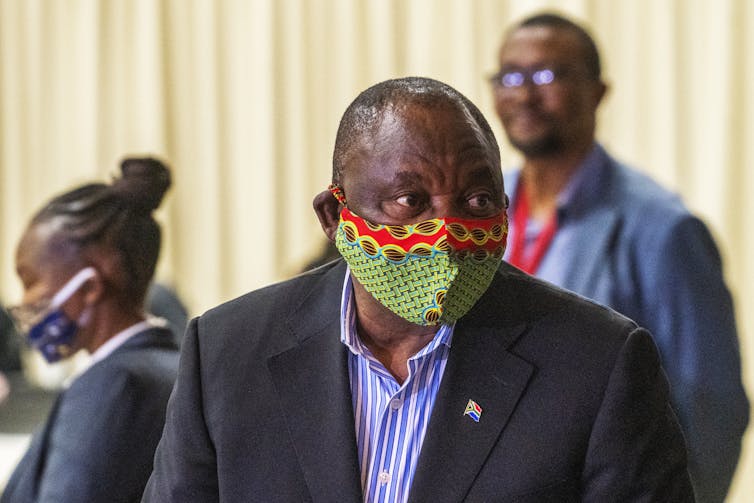South Africans will not be feeling particular free and probably not especially inclined to contemplate more nuanced, philosophical interpretations of freedom as they celebrate Freedom Day.

South Africans “celebrate” Freedom Day through gritted teeth, with a wry smile and an acute sense of irony, this year. Many, if not most, will be lamenting the loss of freedom due to the COVID-19 lockdown.
For most professionals, there will be no public holiday, since days slide seamlessly into one another, punctuated only by an endless succession of Zoom appointments and regular bouts of existential crisis and unease about lack of productivity.
For working class South Africans, the angst will cut even deeper, as food will have run out, accompanied in many cases by an even deeper fear about the future. They may be asking themselves, “will I ever work again?”.
Both bemoan the ban on alcohol sales.
Twenty-six years ago black South Africans voted for the first time. Twenty-five years ago, a freshly minted democratic parliament was immersed in the process of writing a final constitution – one that contains a bill of rights that is widely admired by legal scholars and human rights activists across the globe.
It contains 26 rights, many of which have seen active service in the years since the constitution came into effect in early 1997. The constitution, including the charter of rights enshrined in chapter 2, is inevitably and appropriately the subject of frequent, deep and sometimes bitter contestation.
Rights have frequently been claimed by individuals and communities to defend themselves from irrational, unreasonable or otherwise unlawful conduct by both state and private sector entities.
But these human rights victories may be far from front of mind this particular Freedom Day, in the shadow of the COVID-19 pandemic. Democratic governments throughout the world have been compelled to claim rarely used powers and authority and limit freedoms in response to the threat posed by a deadly virus.
President Cyril Ramaphosa chose to invoke the provisions of the Disaster Management Act at a relatively early stage, on 15 March. This extended the authority of his government so that it can impose restrictions on, for example, the number of people who may gather in any one place.
Consequently, citizens have had to accept stringent restrictions on their normal civil liberties. South Africa’s lockdown is one of the “hardest” in the world. Everyone except for “essential workers” is confined to home, permitted out only when buying food or medicine.
Freedom curtailed
For South Africans, especially black South Africans old enough to remember the pre-1994 era of apartheid rule, this must be especially hard to bear. The sight and sound of the police and the army patrolling the streets to enforce the lockdown regulations must surely stir a painful sense of déjà vu.
The need to have a permit to move from town to town or province to province, or simply to transport produce, is perhaps even more evocative – redolent of JM Coetzee’s novel The Life and Times of Michael K.
Clearly, the right to freedom of movement enshrined in section 21 of the bill of rights is now severely curtailed.
Several other rights are now, in effect, also suspended or limited. Most obviously, the right to freedom of assembly: congregations present a real risk of increasing transmission of the disease, as President Ramaphosa pointed out in his most recent address to the nation.

South African President Cyril Ramaphosa has imposed one of the most stringent COVID-19 lockdowns. EFE-EPA/Jerome De Lay
Equally self-evidently, the right to freedom to trade is curtailed. Most businesses and places of work are required to be closed, unless they are providing an essential service. And students are currently denied the right to education, since schools and university campuses are closed.
Other, more subtle, limitations will apply; for example, to the right to privacy. A crisis of this scale and danger may justify greater intrusion into people’s online and cellular telephonic personae. Substantially reduced levels of data protection, ordinarily a matter of very great concern, may well be justified.
Infringement and protection
This provides an interesting example of how rights’ infringement may cut both ways. As The Guardian has reported, digital surveillance has been a crucial part of South Korea’s apparently successful response to the threat of COVID-19.
Clearly, there is an upside; and a legal justification for the infringement of rights.
On one level, there is nothing extraordinary about this. Rights are not absolute. In a constitutional democracy such as South Africa’s they can be lawfully limited, provided the limitation passes the test in section 36 of the constitution. This includes the principle of proportionality. In essence, this means that the government may only use the least restrictive measure for achieving its aim, the one that causes least damage to protected rights and interests.
Similarly, the regulations issued in a national disaster must comply with the provisions of the bill of rights. A court can declare specific regulations unconstitutional if they impose limitations on rights in a way not justified by the limitation clause.
The execution of Ramaphosa’s five-level “risk-adjusted” exit strategy could well give rise to constitutional litigation if the regulations that give effect to it are either unclear or unfair.
At this point, both the right to equality (and equal treatment) and the right to trade could come into play.
If there is a big surge in COVID-19 infections and illness, then the right to access to health care would be relevant in ensuring that everyone gets the treatment that they need to recover from the virus.
Right to life
Above all, perhaps, the bill of rights protects the right to life. As the lockdown begins slowly to ease, it will be worth remembering that the constraints on freedom were and remain justifiable on this ground alone.
COVID-19 represents a deadly threat to life and to livelihoods. In this sense, it threatens freedom in the most fundamental fashion. And the government is obliged to protect its citizens, limiting civil liberties in defence of freedom.
The socio-economic impact of COVID-19 will be deep and could denude many people of their right to human dignity and substantive equality. That impact, in itself, undermines the notion of transformative constitutionalism that underpins South Africa’s constitutional settlement and the concept of freedom hinged with equality and human dignity that the Constitution articulates.
South Africans will not be feeling particular free and probably not especially inclined to contemplate more nuanced, philosophical interpretations of freedom as they celebrate Freedom Day, even though the post-COVID world will likely present competing conceptions of liberty.
They are not alone. Throughout the world, billions of people are having to adjust to a “new normal”. For how long, and to what extent, civil liberties should be limited or suspended will depend in large measure on the future trajectory of the coronavirus.
Active vigilance will be required to ensure continued restrictions are fully justified and the pandemic is not used as an excuse to impose authoritarian rule in service of devious and despotic political purposes.
Many times in the country’s modern, democratic era the bill of rights has proved to be more than just a piece of paper. For South Africans, hard-won rights will be vigorously defended, just as the limitations on freedom will be scrutinised every step of the way.
Only the secret and not-so-secret autocrats, extreme-right nationalists and populist authoritarian demagogues will want the bill of rights to fall victim to this pernicious pandemic.
Richard Calland, Associate Professor in Public Law, University of Cape Town
This article is republished from The Conversation under a Creative Commons license. Read the original article.
For more news your way, download The Citizen’s app for iOS and Android.
Support Local Journalism
Add The Citizen as a Preferred Source on Google and follow us on Google News to see more of our trusted reporting in Google News and Top Stories.








